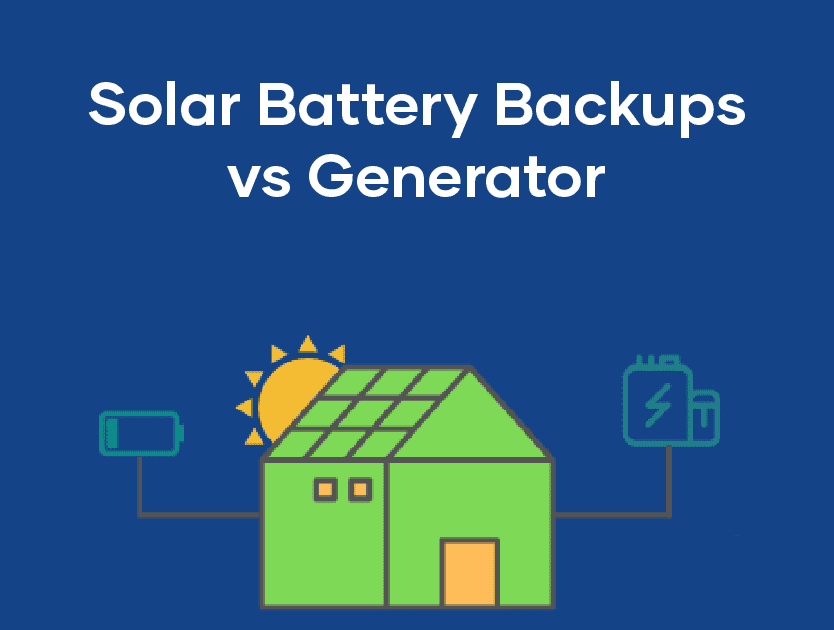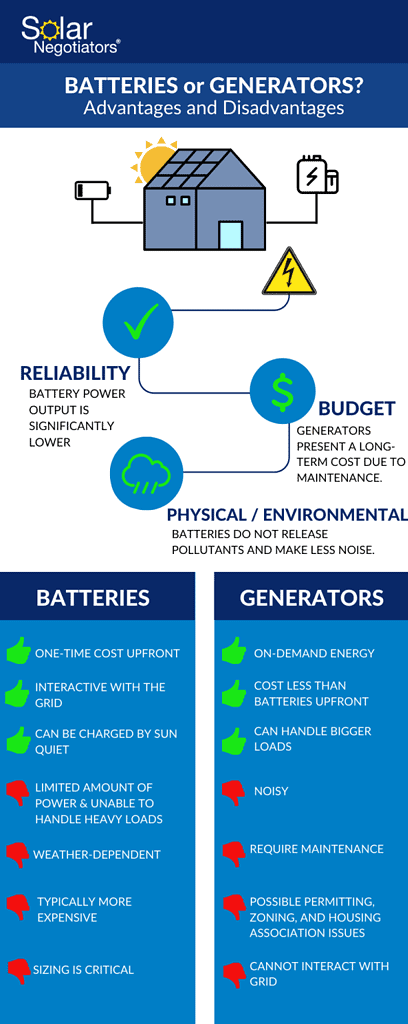
Is A Solar Battery Backup A Good Addition To My Solar System?
Which option will save you more: batteries or generators?
If you want the comfort of knowing your home won’t be without power when an outage unexpectedly strikes or if the grid goes down, adding power storage to your system is a no-brainer. Interest in storage is becoming a more common topic in solar sales conversations.
Backup Power Options
Drastic weather, unexpected outages, and blackouts are likely the main factors driving the interest in backup systems, not only in CA but all over the US. The two most common ways to store power for residential solar owners are through a generator or a solar battery backup. Though it makes economic and environmental sense to connect your solar power system to the electrical grid, deciding between a battery or a generator-based backup system can be tricky and confusing. Many homeowners find themselves unsure of which backup option to choose.
A home generator is a stand-alone unit placed outside of the home. Most can be mobile and relocated. It is powered by a natural gas line and connected to the grid. A solar battery backup is a rechargeable storage unit. It can be charged through the grid or with solar power or wind. Both automatically turn on within seconds if a power outage occurs.

Benefits of Backup Power
Though the upfront costs of backup power are high, costs are a one-time equipment and installation fee in most cases. It is key that consumers know these products will serve as a convenience rather than an investment in future savings. Particularly with batteries, the product/installation costs will likely never be paid off due to energy-related savings. The main goal when purchasing these products is to protect critical loads and minimize the impact of day-to-day functions in the event of a power outage.
Many homeowners don’t know or have not realized that a battery can potentially cut some of their electric bills. Some utilities have TOU (time-of-use) electric rates throughout the day. If you are able to generate power when rates are low and use that power when rates are high, it could result in lower electric bills.
A Closer Look at Costs
| Installation Costs When considering adding battery storage, people don’t often factor in how high the cost of installation can be. This isn’t something companies normally advertise with the price of the product and can be misleading to homeowners in need of backup power. Meanwhile, the price of installation for generators also isn’t low, “Most homeowners pay between $1,255 and $6,899 to install a generator in their home. While the project can cost as little as $400 and as much as $9,500, the average installation price including all variables is $4,077” (homeadvisor.com). |
| Solar Battery Backup Cost Solar batteries range from $5,000 to $7,000 and from $400 per kilowatt-hour (kWh) to $750/kWh. Installation fees include electrical upgrades, taxes, permit fees, or connection charges and can range anywhere from $5,000-$8,000.00. This put the total cost of a backup battery system at around $10k-$15k on average. How long do solar battery backups last? Typically, home solar battery units last between 5 to 15 years. It’s almost certain you will need to replace your solar battery during your 20 to 30 year solar power system’s lifespan. |
| Solar Generator Backup Cost Depending on your needs, you can purchase a generator for as low as $500. However, these aren’t meant to provide power to your entire home in the event of an outage. Smaller, briefcase-style generators, around the 15-watt range, will power small devices like cell phones and laptops. Additionally, for $2,000 to $4,000 you can buy a larger solar generator designed to provide backup power for your home. A larger generator fit to protect critical loads and power several home appliances (more than 20kW) can cost up to $6,000. Most have 1,800 to 3,000 watts, and some offer as many as 245 amp-hours. How long do solar generator backups last? Based on the quality and brand of the generator, the life expectancy of a solar-powered generator typically lasts between 25 and 35 years. |
Size/power load for backup power options
If lights are your main concern during a power outage, batteries will do the job. Homeowners who opt for batteries are comfortable knowing that “critical loads” such as appliances, outlets, and lights will be powered in the event of a power outage.
On the flip side, If you install a generator, critical loads will not be of concern. If it is sized properly, your home or business will continue running without issue if fuel is available.
Is it worth getting a battery for my solar system?
In a nutshell, if you need reliable power for a long period of time and are on a budget: opt for a generator. It is the most cost-effective option and is easier to implement. If budget is not a concern and you are seeking to protect critical loads like your refrigerator, laundry, dishwasher, etc. in the event of a power outage you should install a solar battery backup.

Recent Posts
Latest Solar ITC News: House Committee Proposes Elimination of ITC for Homeowners
Solar Tariffs – Are They Here To Stay?
Solar Backup Solutions: How Do Solar Batteries Work?
Reduce your reliance on the energy grid.
Get Solar In
Your Inbox

Refer friends and get paid in-app
The more referrals you bring in, the higher your earnings.
Earn $1,000 for each referral, and bonuses of up to $1,500 once you hit your 10th referral.




